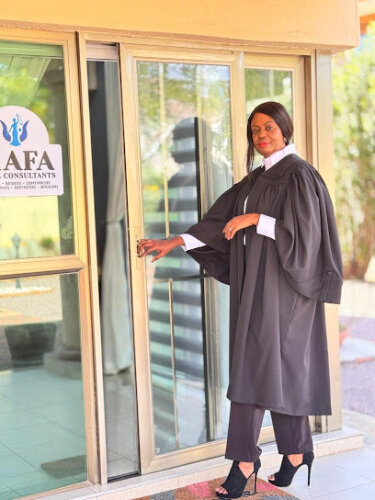Best Guardianship Lawyers in Gaborone
Share your needs with us, get contacted by law firms.
Free. Takes 2 min.
List of the best lawyers in Gaborone, Botswana
About Guardianship Law in Gaborone, Botswana
Guardianship law in Gaborone, Botswana, pertains to the legal process whereby an individual (the guardian) is appointed to take care of another person (the ward), who is typically a minor or someone who is unable to manage their own affairs due to incapacity. The guardian is responsible for making decisions that affect the ward's well-being, ranging from daily care to managing finances and other critical aspects of life. In Botswana, the appointment of a guardian is regulated by both statutory and customary laws, ensuring the best interest of the ward is always prioritized.
Why You May Need a Lawyer
There are several scenarios where you might require the services of a lawyer in matters of guardianship:
- **Establishing Guardianship:** Navigating the legal procedures to become a guardian can be complex. Lawyers can help ensure that all documentation and legal requirements are properly addressed.
- **Disputes Over Guardianship:** Legal disputes can arise between parties who wish to be appointed as guardians. An experienced lawyer can help mediate and resolve these disputes.
- **Changing Guardianship:** If conditions change and there is a need to appoint a new guardian or alter the terms of guardianship, legal assistance is crucial.
- **Guardianship for Incapacitated Adults:** Legal complexities often increase when the guardian needs to be appointed for adults who are incapacitated and unable to manage their affairs. Legal guidance ensures compliance with local laws.
- **Legal Representation:** If you are a ward or a guardian in need of representation in legal proceedings, engaging a lawyer can provide the necessary advocacy and legal advice.
Local Laws Overview
The key aspects of local laws relevant to guardianship in Gaborone, Botswana include:
- **Children’s Act:** This act provides the framework for the care, protection, and guardianship of children in Botswana. It stipulates the rights of the child and the responsibilities of the guardian.
- **Mental Disorder Act:** This law outlines the guidelines for guardianship for individuals with mental incapacities, detailing the process for appointing guardians and their duties.
- **Customary Law:** Customary laws also play a significant role in guardianship matters, especially in rural and tribal communities where traditional practices and norms are observed.
- **Court Procedures:** The courts in Botswana oversee the appointment of legal guardians and ensure that the process adheres to statutory and customary law requirements.
Frequently Asked Questions
1. What is guardianship?
Guardianship is a legal relationship where a guardian is appointed to make decisions and care for another person (the ward) who is unable to manage their own affairs.
2. Who can become a guardian?
Typically, a parent, relative, or a close family friend can become a guardian. The court will evaluate the suitability of the guardianship based on the best interest of the ward.
3. How do I apply for guardianship in Gaborone?
You need to file a petition with the relevant court, providing necessary documentation and evidence to support your application for guardianship.
4. Can guardianship be temporary?
Yes, guardianship can be temporary and is often established to address specific short-term needs or situations.
5. How does the court determine the best interest of the ward?
The court considers various factors including the ward’s physical, emotional, and mental well-being, the guardian's capability, and any preferences expressed by the ward if applicable.
6. Can guardianship be challenged?
Yes, interested parties can challenge the appointment of a guardian by presenting their case to the court, which will then review the evidence and make a determination.
7. What are the responsibilities of a guardian?
The responsibilities include providing care, managing finances, making medical decisions, and ensuring the overall safety and well-being of the ward.
8. Are there financial implications for being a guardian?
Yes, being a guardian can have financial implications as the guardian may be responsible for the ward’s expenses. The court may also require accountability for how the ward's funds are managed.
9. Is it necessary to have a lawyer for guardianship proceedings?
While it is not mandatory to have a lawyer, it is highly recommended due to the legal complexities involved in guardianship cases.
10. Can I resign from being a guardian?
Yes, you can apply to the court to resign from guardianship. The court will consider the request and appoint a new guardian if necessary.
Additional Resources
- **Department of Social Services:** Provides support and services related to child welfare and guardianship.
- **Botswana Council of Non-Governmental Organizations (BOCONGO):** Offers guidance and resources for guardianship issues.
- **Legal Aid Botswana:** Provides legal assistance for those who cannot afford a lawyer.
Next Steps
If you need legal assistance in guardianship matters, consider the following steps:
- **Consult a Lawyer:** Engage a lawyer who specializes in family law and guardianship to discuss your situation and receive professional advice.
- **Gather Documentation:** Collect all necessary documents and evidence supporting your guardianship case to present to your lawyer and the court.
- **File a Petition:** With the help of your lawyer, file a legal petition for guardianship in the appropriate court.
- **Attend Court Hearings:** Be prepared to attend court hearings as required, where you, along with your lawyer, can present your case.
Lawzana helps you find the best lawyers and law firms in Gaborone through a curated and pre-screened list of qualified legal professionals. Our platform offers rankings and detailed profiles of attorneys and law firms, allowing you to compare based on practice areas, including Guardianship, experience, and client feedback.
Each profile includes a description of the firm's areas of practice, client reviews, team members and partners, year of establishment, spoken languages, office locations, contact information, social media presence, and any published articles or resources. Most firms on our platform speak English and are experienced in both local and international legal matters.
Get a quote from top-rated law firms in Gaborone, Botswana — quickly, securely, and without unnecessary hassle.
Disclaimer:
The information provided on this page is for general informational purposes only and does not constitute legal advice. While we strive to ensure the accuracy and relevance of the content, legal information may change over time, and interpretations of the law can vary. You should always consult with a qualified legal professional for advice specific to your situation.
We disclaim all liability for actions taken or not taken based on the content of this page. If you believe any information is incorrect or outdated, please contact us, and we will review and update it where appropriate.












